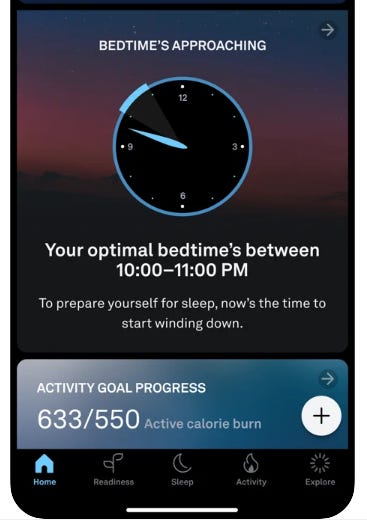The Long Game 99: Readiness Scores, From Deep Dives to Simplicity, News, Company Culture
🚢 Global Supply Chains, To Infinity and Beyond, Partial Reprogramming, Population Collapse, Campground, and Much More!
Hi there, it’s Mehdi Yacoubi, co-founder at Vital, and this is The Long Game Newsletter. To receive it in your inbox each week, subscribe here:
In this episode, we explore:
Readiness scores
Stopping reading the news
From deep dives to simplicity
Company Culture
Partial reprogramming
Global supply chains
Let’s dive in!
🥑 Health
😴 Readiness Scores
As we start gathering more and more data about our health, it’s very tempting for health apps to develop some type of readiness score. By analyzing your resting heart rate, heart variability, body temperature, and sleep, an algorithm gives you how “ready” you are to exercise intensely on a given day.
Although the premise might be interesting, I found that for a lot of people, these readiness scores don’t correlate with performance. In this excellent podcast episode about Zone 2 Training, pro cyclist coach Iñigo explains that they don’t look at daily scores because the athletes learn to go with their feelings.
Personally, I also don’t look at these scores both from a philosophical standpoint and from a self-experimentation one. For example, I had some of my best training sessions at a 60 Readiness Score on Oura and routinely have some of my worst sessions after sleeping 9 hours and getting a 95 Readiness score.
I think this underlines a more significant challenge. It’s very hard, and many times too big of a stretch, to assess how a person feels in a specific moment with data. There are so many factors at play that giving a score is counterproductive.
We also know how these scores can impact your psychology if you give them too much importance. People report feeling anxious or under recovered simply from reading a poor score when they would have felt OK if they didn’t see the score. I lost count of how many people told me they stopped using their Oura/CGM/Smart Watch simply because it was too anxiety-inducing.
That brings us to the problem of seeing the data. Gathering health data is one thing; being constantly presented with it is something else. Just like many people create an emotional relationship with their weight leading them not to want to see the number on the scale, the same can happen with sleep, recovery, glucose, etc.
At Vital, we believe people should be able to customize what they see. Many people want data to understand long-term trends and not obsess over them daily. I want to know that my HRV decreased 10% over the last month, not that my readiness score was 60 this morning. I want to know that my fasting blood glucose decreased 5% over the previous month and not that it’s still too high.
The key is to be data-informed, not data-driven. If data is beneficial in many cases, it would be a mistake to believe it should drive everything.
I think about this paradox very often:
"When a measure becomes a target, it ceases to be a good measure."
— Goodhart's law
"If you can't measure it, you can't improve it." — Drucker's maxim
🌱 Wellness
🚫📰 On Not Consuming The News
I mostly stopped reading the news a few years ago, and it had a very good impact on how I feel. It’s trickier to do on Twitter at times, but the “mute” button can help.
This piece is excellent to understand how detrimental it is to be plugged in to the news 24/7.
The news does not matter. It has little, if any real impact on your life besides what you allow it to have. Like a vampire, The news- whether mainstream, alternative, printed or screen-based- is a parasitic force that will drain you of your energy, happiness and rationality if you welcome it over your threshold and in to your life. The key is to simply never invite it in.
Now, I’m sure this controversial opening paragraph has already got some readers citing objections and caveats, reaching for counter-examples and exceptions, or simply getting ready to wave me off as an uninformed fool who doesn’t know what he is talking about. And perhaps there is something to that, given that my online avatar is a pixelated rendering of Stanczyk the Court Jester. But jesters are kept around because they say what needs to be said. And they express these unpopular messages with enough wit and entertainment that the kings let them keep their heads and indeed value their council. Which is the service that I am hoping to perform for you today.
So. The news- always and forever- is a bad thing. It’s an enervating, confusing, stress-inducing, dubious, unnecessary force that shakes the foundation of our own personal agency as well as causing us to make consistently poor and unwise decisions whilst haemorrhaging a colossal amount of precious time. It makes us sentimental1, fearful and angry. Perpetually perturbed.
🧠 Better Thinking
🛣 From Deep Dives to Simplicity
Lately, I’ve been more and more attracted to making things very simple. Life, exercise, nutrition, sleep, relationships, etc.
I have not always been like that; quite the opposite, in fact, and this tweet from Andrew Huberman powerfully resonated with me.
It’s very hard to reach a simple protocol that works for you directly. Years of research and trial and error are often needed to finally get to this seemingly simple solution.
So even if one aspires to simplicity, it can be constructive to spend the time necessary to learn, try and assess before finally being contempt with how a specific aspect of your life/work/health is.
⚡️ Startup Stuff
🏛 Joy & Competitiveness & Culture
I found this article by Ravi Gupta on company cultures worth sharing.
Talking about culture is easy. Living it is hard. But I think at least part of the reason it’s so hard to live is because people often don’t take the time to rigorously define it.
Although your company's culture is ultimately what you do and not what you say & write on the walls, it’s still important to define the type of team you want to be.
Earlier in my career, I thought young people talked about strategy and execution being important and old people talked about culture being important. I actually think they are both true. It’s just a timing difference. The thing that matters right now is the strategy and the execution. The thing that matters in the long term is the people who are setting that strategy and driving that execution. In my mind, the culture determines who self-selects to be those people over the long-term. So if you care about the people who will make the strategy and execution decisions in the moment beyond right now, you should care about culture.
I think of culture as the unwritten contract with your team. Here’s what matters to us. Here’s what will endure even if everything else changes. You should only put things in it that you will honor no matter what. With that in mind, I think it makes sense to only have one or two of these things.
So how do you pick those one or two things? I am no expert, but here are some thoughts you might consider:
Authenticity isn’t enough. These should be things that you believe with religious intensity.
Accept that a rational person could disagree with your highest cultural value.
Ask yourself what behavior you’ll defend — maybe even be begrudgingly happy about — when a culture carrier overdoes it.
If you’re a founder, ask yourself - “If you had to pick a CEO to replace you, what is the one belief that they have to share with you?”
Finally, there’s a temptation to please everyone when defining your culture. This is a mistake. You simply can’t do this and have to choose the most important values for you. They won’t be the same for all people & companies, and that’s fine.
📚 What I Read
🧬♾ Partial reprogramming deep dive: the good, bad, and partially unresolved
If you’re curious about partial reprogramming, this deep dive is what you’re looking for:
Right now, partial reprogramming is the hottest topic in longevity. The field went from being overlooked to becoming one of the most well-funded research areas after billions of dollars in investment into projects like NewLimit (Brian Armstrong) and Altos Labs (Yuri Milner, Jeff Bezos).
But how promising is it exactly? I decided to spend a few months learning all I could in an attempt to answer that question (see detailed notes on all the papers I’ve read here). This deep dive is a culmination of that effort, summarizing what I’ve learned about the current state-of-the-art and limitations of this field.
💭 Unattractive People Are Unaware of Their Unattractiveness
I found this to be a fascinating research paper
The abstract:
Past research has shown that how people rate their physical attractiveness is only moderately correlated with how they are rated by others, suggesting that at least some people have little insight into their true level of attractiveness.
The present research tests the hypothesis that unattractive people are not aware of their unattractiveness. In fact, six studies (overall N = 1,180) showed that unattractive participants considerably overestimated their attractiveness compared to ratings by strangers.
In contrast, attractive participants were more accurate. If anything, they underestimated their attractiveness. It was also examined why unattractive people overestimate their attractiveness.
As expected, unattractive participants differentiated less between attractive and unattractive stimulus persons than did attractive participants. They were also more likely than attractive participants to select unattractive stimulus persons to compare themselves to.
However, these tendencies did not account for why unattractive participants overestimated their attractiveness, nor did affirming participant’s self-worth. Limitations and avenues for future research are discussed.
To pair with: somewhat related, but not really, just a great thread on a book I mentioned multiple times already.
🌌 To Infinity and Beyond
Earth is finite, humanity doesn’t have to be:
“Infinite growth in a finite world is an impossibility” goes a popular quote. It is usually rolled out to illustrate that sustainability requires humanity to impose limits. Sometimes people then point to a specific element that they argue we will run out of in relatively short order, for instance phosphorus. I believe that this view is fundamentally wrong and ultimately dangerous. Instead, I propose a different motto “A finite world requires infinite growth.”
To explain my disagreement let me go back to a pivotal early moment in my personal development. I was about 8 years old or so when I learned in school that the sun, like all stars, would eventually exhaust itself and in the process first expand and then collapse, likely destroying Earth in the process but certainly making it uninhabitable for humanity. This insight resulted in an existential crisis for me. What is the point of anything, if everything will eventually disappear?
This may strike people as comical, after all we are talking about billions of years from now and there are so many pressing problems in the here and now, so why waste one second on the ultimate fate of the planet? But just ask yourself whether anything would matter, if you knew that Earth was going to explode later tonight. Yes, you might want to spend time with loved ones for mutual comfort, but it ultimately wouldn’t matter. There would be nobody left to remember. The only difference between today and the cosmic fate of the planet is time. And seeing this clearly, I spent several sleepless nights before realizing that humanity could carry on beyond that horizon by becoming space faring.
Ever since that moment, I have been thinking about what it means for Earth to be finite. Yes, Earth’s time is finite. But humanity’s time doesn’t have to be. It is also important to realize that the sun’s death is an upper limit on Earth’s habitability for humanity. There are many ways that could go away much sooner, from self-induced ones, such as the climate crisis or global thermonuclear war to external ones, such as a massive meteorite strike.
🎙 Podcast Episodes of the Week
This week in podcasts:
Rippling CEO on building a customer-obsessed business
I found this conversation fascinating because Rippling's CEO manages to put words on a concept that I’ve been thinking about for years: the compound startup.
"Today, the conventional wisdom on how you should build a company is that you want to focus really narrowly and build one extremely narrow thing and go very deep on it, and I think that a lot of that conventional wisdom is wrong.”
🍭 Brain Food
📉 Population Collapse
Elon has been very vocal about the dangers of falling birth rates over the last few months, and rightfully so. Derek Thompson wrote a great article explaining all the problems coming from a population collapse.
The U.S. population grew at the slowest pace in history in 2021, according to census data released last week. That news sounds extreme, but it’s on trend. First came 2020, which saw one of the lowest U.S. population-growth rates ever. And now we have 2021 officially setting the all-time record.
U.S. growth didn’t slowly fade away: It slipped, and slipped, and then fell off a cliff. The 2010s were already demographically stagnant; every year from 2011 to 2017, the U.S. grew by only 2 million people. In 2020, the U.S. grew by just 1.1 million. Last year, we added only 393,000 people.
What’s going on?
The reasons are multiple, and people not having enough babies is part of them, but death (excess deaths due to COVID accounted for 50 percent of the difference in population growth from 2019 to 2021) & immigration are also crucial factors in this population collapse:
America’s bias against immigration is self-defeating in almost every dimension. “Immigration is a geopolitical cheat code for the U.S.,” says Caleb Watney, a co-founder of the Institute for Progress, a new think tank in Washington, D.C. “Want to supercharge science? Immigrants bring breakthroughs, patents, and Nobel Prizes in droves. Want to stay ahead of China? Immigrants drive progress in semiconductors, AI, and quantum computing. Want to make America more dynamic? Immigrants launch nearly 50 percent of U.S. billion-dollar start-ups. The rest of the world is begging international talent to come to their shores while we are slamming the door in their face.”
I covered many times the fertility & cultural problems leading to fewer babies in the newsletter; here’s a reminder:
Finally, yes, Americans are having fewer babies—like basically every other rich country in the world. Since 2011, annual births have declined by 400,000. Two years ago, I wrote that “the future of the city is childless,” and the pandemic seems to have accelerated that future. Just look at Los Angeles: L.A. County recorded 153,000 live births in 2001 but fewer than 100,000 in 2021. At this rate, sometime around 2030, L.A. births will have declined by 50 percent in the 21st century.
Pair with: What if babies could develop outside of the human body?
🎥 What I’m Watching
🚢 Why Global Supply Chains May Never Be the Same
An excellent documentary on how the global supply chain will be affected in the future.
Pair with: How Long Haul Trucking Works
💣 World War II Every Day with Army Sizes
🔧 The Tool of the Week
🏕 Campground — Music, Together
Campground is another excellent example of a vertical social network. It’s an app to listen to music with your friends! I think it’s very well done.
🪐 Quote I’m Pondering
“It’s as hard to start a small business as it is a big one. You will suffer the same toll financially and psychologically to bring it into existence. So if you were going to dedicate yourself to a business you should choose one with the potential to be huge”
— Steve Schwarzman
If you enjoyed this newsletter, make sure to subscribe if you haven’t 👇
👋 EndNote
Thanks for reading!
If you like The Long Game, please share it on social media or forward this email to someone who might enjoy it. Podcast reviews are also gratefully received. You can also “like” this newsletter by clicking the heart just below this, which helps me get visibility on Substack.
Feel free to email me or find me on Twitter if you have any feedback or questions.
Until next week,
Mehdi Yacoubi
PS: Lots of newsletters get stuck in Gmail’s Promotions tab. If you find it in there, please help train the algorithm by dragging it to Primary. It makes a big difference.






